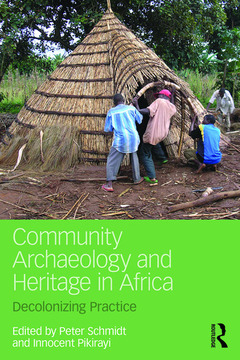Description
Community Archaeology and Heritage in Africa
Decolonizing Practice
Coordinators: Schmidt Peter R., Pikirayi Innocent
Language: English
Subjects for Community Archaeology and Heritage in Africa:
Keywords
Public archaeology; decolonization; decolonizing; engagement; colonial; African; ethnoarchaeology; community; indigenous; Younger Men; Community Based Participatory Research; Ch Association; Kanazi Palace; BPA; Community Archaeology; Olduvai Gorge; Great Zimbabwe; George Abungu; World Heritage Cultural Landscape; Local Knowledge; Dogon Country; South African Archaeology; Fort Jesus; Cultural Bank; Rock Art Centre; Heritage Assets; Rock Art; Kwara State; Rock Art Tourism; Ancestral Remains; Bui Dam; Rock Art Sites; Postcolonial Southern Africa
Publication date: 06-2016
· 15.6x23.4 cm · Paperback
Publication date: 06-2016
· 15.6x23.4 cm · Hardback
Description
/li>Contents
/li>Biography
/li>
This volume provides new insights into the distinctive contributions that community archaeology and heritage make to the decolonization of archaeological practice. Using innovative approaches, the contributors explore important initiatives which have protected and revitalized local heritage, initiatives that involved archaeologists as co-producers rather than leaders. These case studies underline the need completely reshape archaeological practice, engaging local and indigenous communities in regular dialogue and recognizing their distinctive needs, in order to break away from the top-down power relationships that have previously characterized archaeology in Africa.
Community Archaeology and Heritage in Africa reflects a determined effort to change how archaeology is taught to future generations. Through community-based participatory approaches, archaeologists and heritage professionals can benefit from shared resources and local knowledge; and by sharing decision-making with members of local communities, archaeological inquiry can enhance their way of life, ameliorate their human rights concerns, and meet their daily needs to build better futures. Exchanging traditional power structures for research design and implementation, the examples outlined in this volume demonstrate the discipline?s exciting capacity to move forward to achieve its potential as a broader, more accessible, and more inclusive field.
1: Introduction to Community Archaeology and Heritage in Africa: Decolonizing Practice
Innocent Pikirayi and Peter R. Schmidt
2: Maasai People and Oldupai (Olduvai) Gorge: Looking for Sustainable People-Centred Approaches and Practices
Asmeret G. Mehari, Kokeli P. Ryano and Naserian Ndangoya
3: Walking the Long Path to Partnership: Archaeology and Communities in Eastern Africa
George Abungu
4: Collaborative Archaeology and Heritage in Africa: Views from the Trench and Beyond
Peter R. Schmidt
5: Heritage, Memories and Community Development: The case of Shimoni Slave Caves Site, Kenya
Patrick Abungu
6: Archaeology, Local Knowledge and Tradition: The Quest for Relevant Approaches to the Study and Use of the Past in Southern Africa
Southern Africa, Innocent Pikirayi
7: Old Archaeology Camouflaged as New and Inclusive? South African Community Archaeology in the 21st Century
Ndukuyakhe Ndlovu
8: Cultural Pathways to Development Among Communities: The Cultural Banks in Mali
Anne Mayor and Eric Huysecom
9: Perspective on Heritage, Local Community and Archaeological Engagements in Parts of Northern Yorubaland, Nigeria
Jonathan O. Aleru and Kolawole Adekola
10: “We will not Relocate until our Ancestors and Shrines Come with Us”: Heritage and Conflict Management in the Bui Dam Project Area, Ghana
Dam Project area, Ghana Wazi Apoh and Kodzo Gavua
11: In Lieu of Community Archaeology? Mandara Archaeological Project (1984-2008): Outreach and Involvement in Heritage issues
Nic David and Judy Sterner
12: Community Archaeology and Heritage in Africa: Conversations inspired by a workshop
Carol McDavid, Uzma Rizvi and Laurajane Smith
Peter R. Schmidt is Professor of Anthropology and African Studies at the University of Florida, USA, as well as Extraordinary Professor of Anthropology and Archaeology at the University of Pretoria, South Africa.
Innocent Pikirayi is currently Professor and Head of the Department of Anthropology and Archaeology at the University of Pretoria, South Africa.




